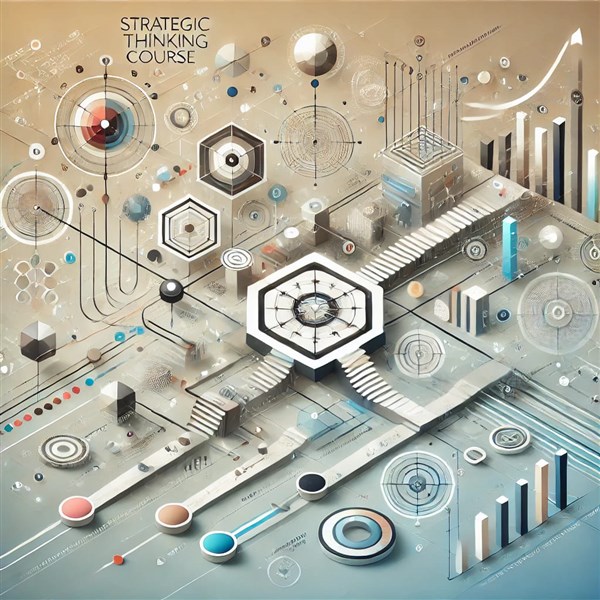
In today’s competitive job market, professionals need more than technical expertise to succeed; they need to cultivate strategic thinking skills that drive better decisions, solve complex problems, and foster innovation. Strategic thinking is about seeing the bigger picture, aligning goals with long-term vision, and crafting actionable plans to get there. For individuals aiming to advance their careers or take on leadership roles, a strategic thinking course can be a game-changer. Let’s explore the core benefits of such training and how it can contribute to your professional growth.
Benefits of Taking a Strategic Thinking Course
1. Enhanced Decision-Making Abilities
Decision-making is an essential part of any role, but as you move up in your career, the decisions you make often carry greater weight and impact. A strategic thinking course teaches you to evaluate options, assess risks, and consider long-term outcomes before making decisions. This process often involves techniques such as cost-benefit analysis, scenario planning, and weighing risks versus rewards.
By developing a strategic mindset, you’ll be better equipped to make decisions that align with larger organizational goals, minimizing potential risks while maximizing outcomes. These skills are not only valuable in daily operations but also critical during crisis management, where quick and effective decisions can prevent issues from escalating.
2. Improved Problem-Solving Skills
Problem-solving is a critical skill in any job, and strategic thinking takes it to a new level. Courses on strategic thinking typically focus on a structured approach to identifying and analyzing problems. Techniques such as root cause analysis, SWOT (Strengths, Weaknesses, Opportunities, Threats) analysis, and the 5 Whys method are often taught as part of strategic problem-solving training.
By using these frameworks, you’ll learn to identify the root causes of issues rather than just addressing surface-level symptoms. This skill enables you to create sustainable solutions that not only resolve current problems but also prevent similar ones from occurring in the future. For career advancement, problem-solving at a strategic level is often a key differentiator for high-performing professionals and leaders.
3. Fostering Innovation and Creativity
Strategic thinkers are not only adept at solving problems—they’re also skilled at thinking outside the box to foster innovation. Strategic thinking courses encourage creative approaches to business challenges, helping professionals to spot unconventional solutions. Many of these courses use brainstorming exercises, design thinking principles, and collaborative problem-solving workshops to stretch your imagination and allow you to see challenges from different perspectives.
Innovation is critical for staying relevant in today’s fast-paced world, where industries and technologies are constantly evolving. Professionals who can blend creativity with strategic foresight bring tremendous value to their organizations, often leading projects that enhance competitive advantage.
4. Building a Visionary Leadership Mindset
For those aspiring to leadership roles, a strategic thinking course can provide the tools and mindset needed to lead with vision. Visionary leaders can articulate a clear path forward, inspiring teams and stakeholders to work toward common goals. Strategic thinking training helps you develop the skills to create long-term plans, set realistic objectives, and communicate those plans effectively.
Courses on strategic thinking often emphasize the importance of understanding industry trends, competitor landscapes, and organizational strengths. With this knowledge, you’ll be able to position your organization (or your team) for future growth. A visionary leader not only focuses on immediate goals but also sets the stage for sustainable success.
5. Better Alignment with Organizational Goals
Organizations look for employees who understand their vision and contribute to overarching goals. By taking a strategic thinking course, you gain insights into aligning your tasks and objectives with your organization’s mission. Strategic thinkers can analyze company goals and identify areas where their contributions can make the greatest impact.
For example, a marketing professional with strategic thinking skills might align campaign strategies with the company’s long-term brand vision, while a project manager might prioritize projects that deliver the most significant value to the business. Understanding how your role contributes to the bigger picture makes you an invaluable team member and positions you for career growth within the company.
6. Advanced Planning and Organizational Skills
Effective planning is an outcome of strategic thinking. Professionals who excel in this area are skilled at setting achievable milestones, estimating resources accurately, and preparing for potential setbacks. Strategic thinking courses often emphasize forward planning, helping you develop the skills to map out tasks and timelines that lead to success.
With advanced planning skills, you can work more efficiently, reduce the likelihood of last-minute issues, and meet project deadlines consistently. This level of organization is a hallmark of strategic thinkers and is especially useful for roles in project management, operations, and any position requiring extensive coordination.
7. Adaptability to Change
A key component of strategic thinking is the ability to anticipate and adapt to change. Courses on strategic thinking often include training on how to evaluate shifting market dynamics, analyze emerging trends, and respond to uncertainties. This adaptability allows you to make adjustments without losing sight of long-term objectives.
Being able to pivot strategies as circumstances change is a valuable asset in today’s volatile job market, where professionals must be flexible to succeed. In fact, adaptability is a quality many employers look for, as it reflects resilience and the ability to thrive in a dynamic environment.
8. Networking Opportunities with Like-Minded Professionals
Strategic thinking courses often attract ambitious, forward-thinking individuals looking to grow in their careers. Participating in a course can provide valuable networking opportunities, enabling you to connect with peers, mentors, and industry leaders who share similar goals. These relationships can lead to new career opportunities, partnerships, and mentorship arrangements.
Building a professional network of strategic thinkers not only provides insights and support but can also inspire you to continue developing your skills and advancing your career. The shared learning environment often fosters collaboration and knowledge exchange, benefiting everyone involved.
9. Increasing Your Value to Employers
Strategic thinkers bring a high level of value to their organizations. By mastering strategic thinking skills, you position yourself as someone capable of driving initiatives, improving efficiency, and creating long-term value. Employers recognize the importance of these skills, often rewarding professionals who bring strategic insights to their roles.
For instance, a finance professional who can use strategic thinking to optimize budgeting processes, or a product manager who can align product development with customer needs, becomes a critical asset to the business. Developing these skills not only increases your employability but also paves the way for promotions and leadership roles.
Conclusion
A strategic thinking course offers numerous benefits for career growth, equipping professionals with enhanced decision-making, problem-solving, and leadership skills. As industries continue to evolve, the demand for strategic thinkers who can navigate complexity and drive long-term success will only increase. Whether you’re looking to climb the corporate ladder, make a greater impact in your current role, or prepare for future leadership opportunities, investing in a strategic thinking course from Koenig Solutions can be a significant step in your career development journey.
In summary: Strategic thinking isn’t just a skill; it’s a mindset that empowers professionals to make impactful decisions, foster innovation, and contribute to organizational success. By enrolling in a course dedicated to this discipline, you can build a toolkit of techniques that will support your career for years to come.







COMMENT